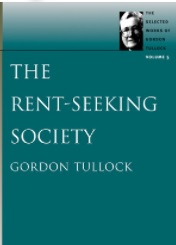I’ve written columns about wonky economic concepts such as “deadweight loss” and “public goods.” Today’s topic is “rent seeking,” which is part of “public choice” and is described by Professor Alex Tabarrok of George Mason University.
To elaborate, here’s a video from Professor Michael Munger from Duke University.
The basic message of both videos is that “rent seeking” occurs when interest groups manipulate the political system to obtain undeserved riches.
And there are all sorts of examples of policies that exist solely because interest groups get politicians to tilt the playing field – including trade barriers, farm subsidies, occupational licensing, and bureaucrat salaries. As pointed out in the videos, these rent-seeking policies reduce prosperity. But what’s the origin of the term? In the modern era, it’s often associated with Gordon Tullock, one of the founders of public choice school of economic analysis. But the term actually was coined a couple of hundred years ago by David Ricardo, as explained by Professor David Henderson of the Naval Postgraduate School.
Rent seeking” is one of the most important insights in the last fifty years of economics and, unfortunately, one of the most inappropriately labeled. …People are said to seek rents when they try to obtain benefits for themselves through the political arena. …But why do economists use the term “rent”? Unfortunately, there is no good reason. David Ricardo introduced the term “rent” in economics. It means the payment to a factor of production in excess of what is required to keep that factor in its present use. …What is wrong with rent seeking? Absolutely nothing. I would be rent seeking if I asked for a raise. My employer would then be free to decide if my services are worth it. Even though I am seeking rents by asking for a raise, this is not what economists mean by “rent seeking.” They use the term to describe people’s lobbying of government to give them special privileges. A much better term is “privilege seeking.”
To elaborate, there’s nothing wrong with rent seeking as defined by Ricardo. But rent seeking is now associated with “privilege seeking,” which obviously is very unsavory. Ben Casselman of FiveThirtyEight also wrote on rent seeking.
Imagine you run a barbershop and you learn that someone is planning to open a rival business down the street. What do you do? One option, of course, would be to compete the old-fashioned way by offering lower prices or better service. But the old-fashioned way is hard! Wouldn’t it be nice if you could keep your competitor from setting up shop in the first place? There’s evidence that a growing number of businesses in the U.S. are trying to do exactly that. And while that may be good for them, it’s bad for entrepreneurs, workers and the economy as a whole. …Economists call this kind of behavior “rent-seeking,” which is another way of saying “gaming the system to make more money than you’ve earned.” …There is evidence that rent-seeking, in various forms, is becoming more common in the U.S. economy. In a recent paper, economist Dean Baker argued that rent-seeking has driven much of the recent increase in income inequality. And while Baker is a liberal, conservatives are also concerned about rent-seeking, such as land-use restrictions that make it hard to build housing in high-priced coastal cities.
The bottom line is that politicians spend much of their time buying their way to reelection by providing undeserved goodies to various interest groups. You can call it rent seeking. You can call it corruption. Or you can call it politics.
But one obvious takeaway is that shrinking the size and scope of government is the only effective way of reducing rent seeking.
P.S. If you’re in the mood for more economic wonkiness, here are several videos that explain “Austrian economics” and two videos that explain the price system.

No comments:
Post a Comment